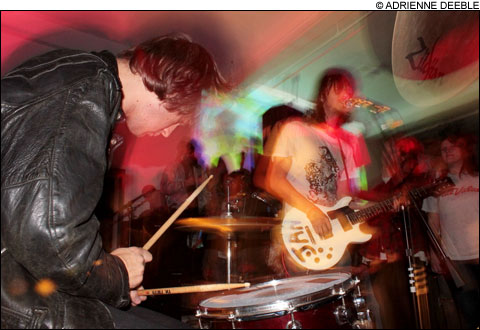
FILLING A VOID The Homegrown Fest in October was one of several events that established the Temple as a new model for DIY venues — and led to its temporary closing. |
Since its opening in May, Jamaica Plain's 200-person-capacity Temple Sound & Stage has emerged as a focal point of Boston's underground music scene. In just a few months, the multimedia art space and recording studio known as "The Temple" became a megaphone for the local community, opening its above-ground space to Whitehaus bands, Bodies of Water shows, and an all-ages crowd. It hosted touring acts like Oneida, Jeff the Brotherhood, and Japanther, as well as festivals that included the Boston Underground Summit, Weirdstalk, and the three-day Homegrown Festival headlined by Major Stars, Tunnel of Love, and Damon & Naomi. The year 2010 was huge for Boston's underground, and the Temple was a big part of it.
But though the venue's all-ages, DIY, non-commercial nature has filled a "gaping void" in Boston's music community, according to Bodies of Water booking agent Dan Shea, the Temple's live-music operation is now on hiatus. The Homegrown Fest, in October, prompted complaints about the noise and calls to police, who discovered problems with the Temple's entertainment license. Shows had to be canceled, and while the venue continues to be a practice space and a recording studio, the managers are soundproofing the ceiling and applying for the correct license. The hope is to have shows again by summer 2011, so as to provide the underground scene with an all-ages venue on a par with traditional rock clubs.
It won't be easy. Working to meet Boston's notoriously tough entertainment-licensing standards, Washington State natives and Temple co-founders TJ Wenzl and Tanner Musick-Slater, both in their 20s, want the city to understand the importance of a place like the Temple. "This is the only space in JP where you can take your band out of the garage and onto a stage in front of 200 people," says Wenzl.
Shea concurs: "The city needs a space of that size." At bars, he points out, people might show up just to drink, whereas at the Temple there's "an appreciation of what's going on artistically. A place like the Temple is a haven for that freedom of positive expression. And there is nothing like that in Boston."
Located not far from the Whitehaus, a popular house venue that has hosted shows since 2006, the Temple connected with that scene but upgraded the experience. A 36,000-square-foot space with clean hardwood floors, a high ceiling, and an expensive sound system makes for a setting that a lot of the house-show crowd isn't used to. Lofted three floors above ground, the venue shares space with an organic food market, a parenting magazine, and a tae kwon do studio.Nearby on Huntington Avenue, music and art space Yes Oui Si is encountering similar issues as it preps for a January opening. Co-owners Miguel de Braganca and Olivia Ives-Flores, also in their 20s, hope to create a more sustainable space than the basements where Boston's underground currently thrives. Although Ives-Flores sees these organic environments as the "pulse of Boston's creative community," they are prone to police-ordered shutdown and can be unsafe. De Braganca says that, because Boston has so many students, the police are "more tuned in to what kids are doing" and more likely to see non-conventional venues as illegal gatherings of young people being loud.